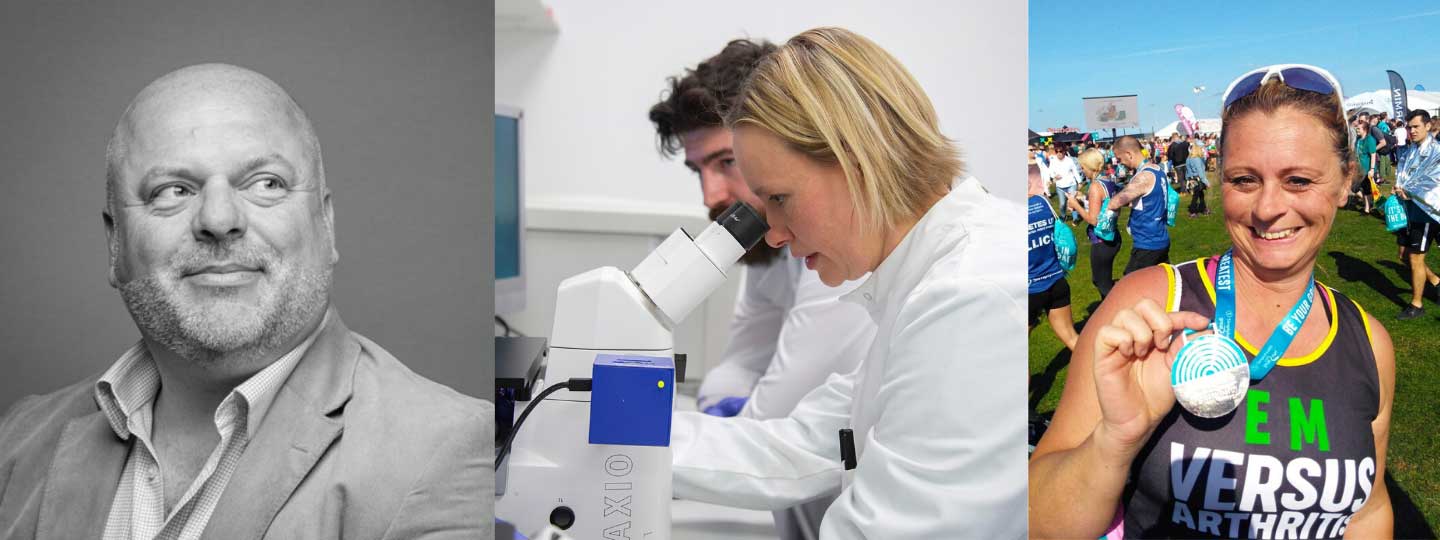Exploring the relationship between sport, exercise and osteoarthritis
09 July 2020
Exercise is one of the best things you can do to improve your symptoms of arthritis.
We support vital research to further understand this, including one of our research centres – the Centre for Sport, Exercise and Osteoarthritis Versus Arthritis, based at Nottingham Universities Hospitals NHS Trust, working alongside the Universities of Nottingham, Bath, Oxford, Southampton, Loughborough and Leeds.
Since the centre was set up in 2012, it’s been making strides towards understanding the links between sport exercise and osteoarthritis , and developing ways to help keep people active throughout their lives.
We’re delighted to announce Professor James Bilzon as the new director of the centre.
As part of our 'Meet the Researchers' series, James tells us more about his role and why research into exercise and osteoarthritis is so important.
Tell us about yourself and your research background
Since my first academic appointment at the University of Bath (as Director of Studies for the MSc in Sport and Exercise Medicine) my research has increasingly focused on exercise-based rehabilitation in the prevention and management of disabling conditions and chronic diseases.
After securing my Professorship in 2016, I established the University of Bath’s Centre for Clinical Rehabilitation and Exercise Medicine (CREM).
My research has always had a strong focus of health and exercise.
I studied Sports Science at Loughborough University and worked with the Ministry of Defence (MoD), before moving to the Institute of Naval Medicine, where I studied for my PhD and focussed on nutrition, physical training and injury prevention research.
I also led my own research group focusing on musculoskeletal injury prevention and rehabilitation at the Army Recruiting and Training Division.
Why is sport, exercise and osteoarthritis research important?
The relationship between sport, exercise and osteoarthritis is both complex and intriguing. It’s no secret that some sports can present a small risk of musculoskeletal injuries, which can, increase the future risk of osteoarthritis.
However, we now have compelling evidence that participation in certain types of exercise can reduce the risk of musculoskeletal injury and help individuals to rehabilitate and recover from those injuries, reducing the future risk of osteoarthritis.
Maintaining an active and healthy lifestyle can also reduce the future risk of osteoarthritis developing and progressing, particularly in the lower-limb joints.
Understanding how sport, exercise training and general movement can contribute to a reduced osteoarthritis risk profile is crucial to support public health advice and reduce the global impact of arthritis.
How does the research at the centre benefit people with arthritis?
We work closely with a range of people with osteoarthritis in the design, conduct and presentation of our research, including two of our major research themes:
- Stratified care and personalised medicine and
- life course impact for musculoskeletal health.
Valuable insight from patient representatives also steers our research strategy to ensure it delivers tangible patient benefit.
We work closely with Versus Arthritis to provide expert advice and input into patient-facing initiatives.
Including being part of the Versus Arthritis Physical Activity Expert Advisory Group, helping to shape patient-facing services based on the latest scientific evidence.
What do you hope to achieve in your new role as director?
Our Centre has benefited enormously from the leadership provided by Professor Mark Batt over the last 8 years. We’ve worked hard to ensure a smooth transition and I hope to continue that style of leadership for our talented research ‘family’.
We continue to work closely with Versus Arthritis to ensure our evidence is rapidly translated into user-focused advice, guidance and services to help people living with arthritis.
How is the centre adapting its research to the COVID-19 world?
There’s no doubt that the COVID-19 pandemic has had an impact on our research, but this has raised opportunities as well as challenges.
Some centre staff and some equipment have been redeployed to support COVID-19 related clinical trials. We’ve also put some new clinical trials on hold until we can safely recruit patients again.
Some of our research projects have slightly changed focus in the short term, turning our attention to conducting reviews and publishing existing data.
We expect to be back in our research laboratories very soon and are developing procedures to ensure social distancing and the safety of our staff, students and participants.
There has been a renewed focus on our research to engage people with osteoarthritis using digital tools and platforms which will inform and motivate them to remain fit, strong and active during this period.
For more information on arthritis and exercise and exercises to manage pain.
Read more about our research
We’ll keep you posted on progress and updates. In the meantime, find out more about our research.
We’re here whenever you need us.
If you’re feeling isolated from family and friends during these uncertain times, we’re here for you.
- If you would like to talk to someone, you can call our free helpline on 0800 5200 520 (Monday to Friday, 9am to 6pm).
- Join our online community.
- Stay in touch and follow us on Twitter, Facebook and Instagram.